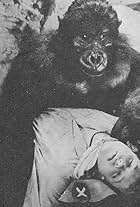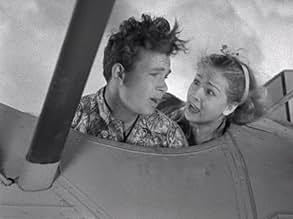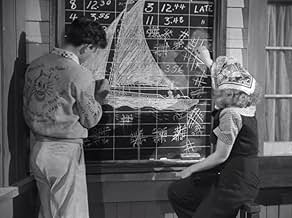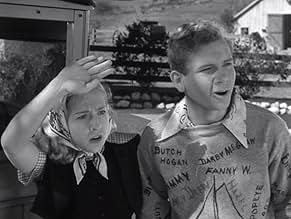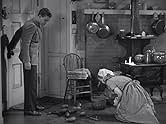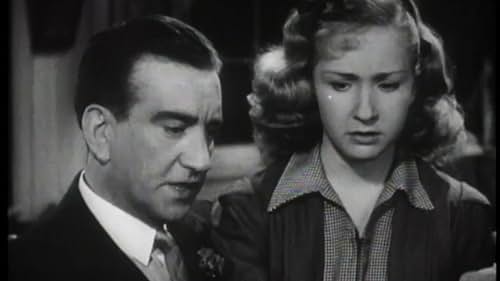Frankie Thomas(1921-2006)
- Actor
- Writer
- Soundtrack
This one-time wiry, curly-haired juvenile actor of 30s Depression era
films grabbed major focus toward the end of his acting career as 50s
space hero Tom Corbett on the smaller screen, then moved away from the
limelight finally seeing his future in the cards.
He was born Frank M. Thomas, Jr. on April 9, 1921, the only child of acting Manhattanites Frank M. Thomas and Mona Bruns. Well-established on the New York stage, his parents encouraged their young son into the business. The young actor first conquered Broadway in the early 30s appearing with Mildred Natwick and James Stewart in "Carry Nation" (1932) at age 11. He made a few more Broadway appearances, including Little Ol' Boy (1933) and "Thunder on the Left" (1933) before tackling films, making his debut creating his stage role in Wednesday's Child (1934) as the teenage son of Karen Morley and Edward Arnold. Both of his parents appeared in minor roles. Frankie went on to star in the sentimental tearjerker A Dog of Flanders (1935), then headed the cast as the titular young hero searching for his father in Africa in Tim Tyler's Luck (1937). Although he was just one of the boys in MGM's Boys Town (1938) and just one of the Little Tough Guys (a branching off of the "Dead End Kids") in Little Tough Guys in Society (1938), he managed to grab a co-starring role and become a brief bobbysoxer crush playing Ted Nickerson, little Bonita Granville's dry-humored, sleuthing boyfriend, in the four-episode "Nancy Drew" mystery film series, which ran from 1938-1939. He played tough in such movies as Angels Wash Their Faces (1939) and a number of military cadet types in such films as On Dress Parade (1939), Flying Cadets (1941) and The Major and the Minor (1942) before military duty itself called, signifying the abrupt end of a seemingly promising start as an adult film actor.
He served with both the Navy and the Coast Guard during WWII. Upon his discharge, he moved to New York and found steady radio work (over 1500 programs) as well as parts on early TV daytime such as the 15-minute serial A Woman to Remember (1949), which was the first five-times-a-week soaper to evolve. He received lasting fame and cult identification, however, the following year when he was cast in the title role of Tom Corbett, Space Cadet (1950), as a cadet in training for the elite Solar Guard, 400 years in the future. An All-American hero to children nationwide, sci-fi was a huge rage at that time and he stayed with the show for five years. It was a 15-minute program that aired live three times a week.
Following this peak of fame, Frankie gave up acting altogether and wrote for radio and TV. He also produce the "Four Star Theater" for a time. Remaining a bachelor for much of his adult life, he lived a rather enviable Omar Sharif existence as a bridge master who taught recreational bridge while playing on the circuit with all the other master players. In addition to that, he continued to hone his writing talents as a mystery novelist. In the late 1980s, he met and married wife Virginia who had two children from a prior marriage. His wife died in 1997. Frankie passed away of respiratory failure in Sherman Oaks, California nine years later.
He was born Frank M. Thomas, Jr. on April 9, 1921, the only child of acting Manhattanites Frank M. Thomas and Mona Bruns. Well-established on the New York stage, his parents encouraged their young son into the business. The young actor first conquered Broadway in the early 30s appearing with Mildred Natwick and James Stewart in "Carry Nation" (1932) at age 11. He made a few more Broadway appearances, including Little Ol' Boy (1933) and "Thunder on the Left" (1933) before tackling films, making his debut creating his stage role in Wednesday's Child (1934) as the teenage son of Karen Morley and Edward Arnold. Both of his parents appeared in minor roles. Frankie went on to star in the sentimental tearjerker A Dog of Flanders (1935), then headed the cast as the titular young hero searching for his father in Africa in Tim Tyler's Luck (1937). Although he was just one of the boys in MGM's Boys Town (1938) and just one of the Little Tough Guys (a branching off of the "Dead End Kids") in Little Tough Guys in Society (1938), he managed to grab a co-starring role and become a brief bobbysoxer crush playing Ted Nickerson, little Bonita Granville's dry-humored, sleuthing boyfriend, in the four-episode "Nancy Drew" mystery film series, which ran from 1938-1939. He played tough in such movies as Angels Wash Their Faces (1939) and a number of military cadet types in such films as On Dress Parade (1939), Flying Cadets (1941) and The Major and the Minor (1942) before military duty itself called, signifying the abrupt end of a seemingly promising start as an adult film actor.
He served with both the Navy and the Coast Guard during WWII. Upon his discharge, he moved to New York and found steady radio work (over 1500 programs) as well as parts on early TV daytime such as the 15-minute serial A Woman to Remember (1949), which was the first five-times-a-week soaper to evolve. He received lasting fame and cult identification, however, the following year when he was cast in the title role of Tom Corbett, Space Cadet (1950), as a cadet in training for the elite Solar Guard, 400 years in the future. An All-American hero to children nationwide, sci-fi was a huge rage at that time and he stayed with the show for five years. It was a 15-minute program that aired live three times a week.
Following this peak of fame, Frankie gave up acting altogether and wrote for radio and TV. He also produce the "Four Star Theater" for a time. Remaining a bachelor for much of his adult life, he lived a rather enviable Omar Sharif existence as a bridge master who taught recreational bridge while playing on the circuit with all the other master players. In addition to that, he continued to hone his writing talents as a mystery novelist. In the late 1980s, he met and married wife Virginia who had two children from a prior marriage. His wife died in 1997. Frankie passed away of respiratory failure in Sherman Oaks, California nine years later.
